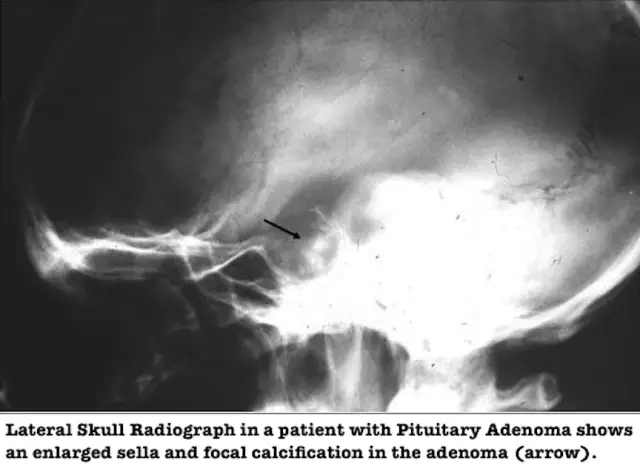- Author Rachel Wainwright wainwright@abchealthonline.com.
- Public 2023-12-15 07:39.
- Last modified 2025-11-02 20:14.
5 myths about pituitary tumors
The pituitary gland is an endocrine gland located at the base of the brain. It is one of the most important organs of the endocrine system: it produces hormones that regulate growth processes, metabolism and reproductive function. Pituitary neoplasms account for almost 15% of all intracranial tumors.
Despite the fact that modern medicine is quite successfully coping with the treatment of pathologies of this kind, they are still surrounded by many myths. Today we will dispel the most common ones.

Source: depositphotos.com
All pituitary tumors are malignant
The vast majority of pituitary tumors are benign. Most often these are adenomas (tumors from cells of glandular tissue). They are not as dangerous as malignant ones, but they can have a significant effect on the hormonal background in the body.
Patients with pituitary tumors usually suffer from dysfunctions of the adrenal, thyroid, and gonads. In addition, a large adenoma compresses the cranial and optic nerves, which leads to persistent headaches and seizures, as well as the development of visual impairment.
Pituitary tumors are difficult to diagnose
This is not true. Tumors of the pituitary gland are perfectly visualized using X-ray, magnetic resonance imaging and computed tomography of the brain. To clarify the diagnosis, an ophthalmological examination is carried out, an assessment of the level of hormones in the patient's blood, urine and saliva.
A detailed study of the research results and taking into account the patient's complaints, as a rule, allows not only establishing the presence of a pituitary neoplasm, but also determining the type of tumor and assessing its size.
Heredity is the main cause of pituitary tumors
It is assumed that the development of some of these tumors may indeed be genetically determined, but the reason for their appearance has not yet been reliably established. Today it is known that among the provoking factors, a significant place is occupied by skull injuries, neuroinfections, chronic diseases of the ENT organs (for example, sinusitis) and neoplasms of other endocrine glands.
Pituitary tumors are treated exclusively with surgery
Each patient suffering from a pituitary tumor receives individual treatment, the tactics of which is determined by the type and stage of the neoplasm. For example, in the treatment of prolactinoma (a tumor that affects the production of the hormone prolactin), tableted drugs play a major role. Their reception in most cases leads to a decrease and sometimes complete resorption of the neoplasm.
Tumors that affect the production of growth hormone are often removed using endoscopic surgery (intervention is performed through the nasal passages). In the recovery period, drug treatment is carried out. In some cases, radiation therapy is also used.
Pituitary tumors do not appear externally
One of the main functions of the pituitary gland is the production of somatotropin, the so-called growth hormone. Violation of its production is accompanied by significant changes in a person's appearance (for example, acromegaly).
People with this disorder grow faster than their peers from early childhood. All of their bones become abnormally large. Upon reaching maturity, patients are very tall, excessively large and rough facial features, large feet and hands. External changes are accompanied by impaired reproductive function, multiple joint lesions, headaches. The risk of developing cardiovascular, pulmonary and oncological diseases for such patients is extremely high.
Tumors of the pituitary gland, which affect the production of hormones, can be indicated by fat deposits in certain areas of the body, an increase in the mammary glands in men, skin manifestations, changes in hair and nails, and other external signs.
Constant fatigue or nervousness, persistent headaches, chronic runny nose, convulsions, periodic visual disturbances (double vision, decreased visual acuity or narrowing of the field of vision) are a reason to consult a doctor and undergo an examination, including determining the level of pituitary hormones in the blood. In addition, women need to pay attention to the stability of the menstrual cycle, and men - to potency disorders. Tumors of the pituitary gland are successfully diagnosed and in most cases are treatable. Seeking medical attention earlier increases the chance of a full recovery.
YouTube video related to the article:

Maria Kulkes Medical journalist About the author
Education: First Moscow State Medical University named after I. M. Sechenov, specialty "General Medicine".
Found a mistake in the text? Select it and press Ctrl + Enter.






